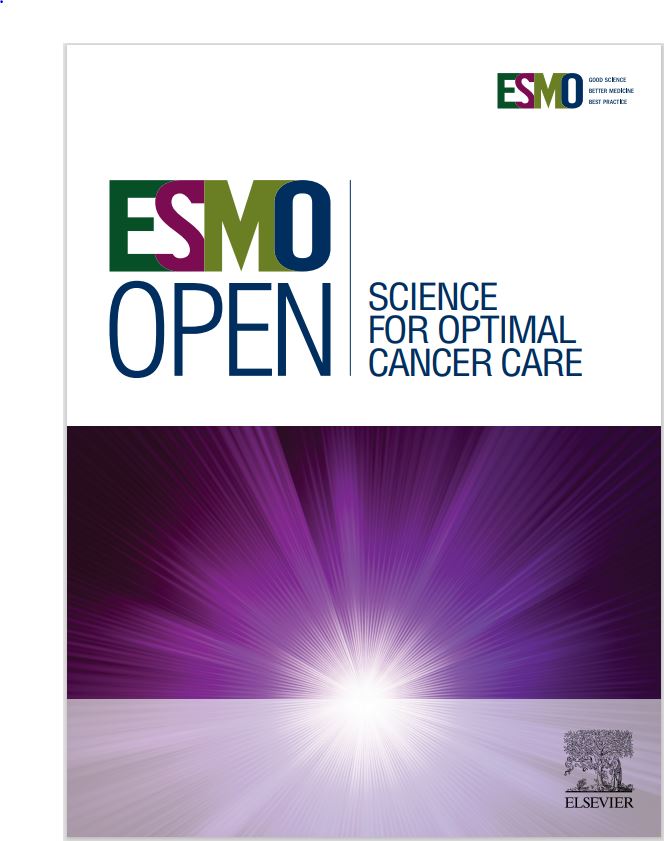Systemic treatments in recurrent or metastatic salivary gland cancer: a systematic review
IF 7.1
2区 医学
Q1 ONCOLOGY
引用次数: 0
Abstract
Background
Salivary gland cancers are infrequent and pose a challenge owing to their histological diversity and varied clinical behavior, making the selection of optimal systemic treatments for advanced or recurrent stages difficult. This systematic review aims to assess overall survival outcomes and systemic treatment responses across four types of salivary cancers.
Methods
A PubMed and Google Scholar search identified studies involving initially advanced or relapsed cases undergoing systemic treatment. Studies with clear, individualized data on treatment responses and outcomes were selected based on the Preferred Reporting Items for Systematic Reviews and Meta-Analyses (PRISMA) checklist. Of the 723 studies screened, 44 met our inclusion criteria.
Results
A total of 426 cases of recurrent/metastatic salivary gland cancer, mostly salivary duct carcinoma (SDC; n = 219) and adenoid cyst carcinoma (ACC; n = 167), were included. Histomolecular markers were heavily associated with histology, with HER2 overexpression and androgen receptor nuclear expression typically found in SDC and adenocarcinoma not otherwise specified cases and KIT overexpression only in ACC. The response rates were associated with specific receptor blockage, with trastuzumab plus chemotherapy, and bicalutamide being the most effective (overall response rate 80% and 42.8%, respectively). Moreover, the response to treatment positively influenced overall survival (responders 38 versus non-responders 18.7 median months; P < 0.001). In this retrospective analysis of a particular cohort, survival outcomes per histology types showed that anti-human epidermal growth factor receptor 2 therapy was more effective for SDC, while chemotherapy was more effective for ACC.
Conclusion
Systemic treatments contribute to the survival of patients with salivary gland cancer at relapsed or newly advanced stages. The response to treatment is heavily influenced by histological subtype and treatment specificity.
复发性或转移性唾液腺癌的系统治疗:系统综述。
背景:唾液腺癌症并不常见,由于其组织学多样性和临床表现各不相同,因此很难为晚期或复发阶段的患者选择最佳的系统治疗方法。本系统综述旨在评估四种唾液腺癌症的总体生存结果和系统治疗反应:方法:通过PubMed和谷歌学术搜索,确定了涉及接受系统治疗的晚期或复发病例的研究。根据《系统综述和荟萃分析首选报告项目》(Preferred Reporting Items for Systematic Reviews and Meta-Analyses,PRISMA)核对表,筛选出具有明确、个性化治疗反应和结果数据的研究。在筛选出的 723 项研究中,有 44 项符合我们的纳入标准:结果:共纳入 426 例复发性/转移性唾液腺癌病例,其中大部分为唾液腺导管癌(SDC;n = 219)和腺样囊肿癌(ACC;n = 167)。组织分子标记与组织学密切相关,HER2过表达和雄激素受体核表达通常出现在SDC和非特殊腺癌病例中,而KIT过表达仅出现在ACC病例中。反应率与特异性受体阻断有关,其中曲妥珠单抗加化疗和比卡鲁胺最有效(总反应率分别为80%和42.8%)。此外,治疗反应对总生存期也有积极影响(有反应者的中位生存期为 38 个月,无反应者为 18.7 个月;P < 0.001)。在这一特定队列的回顾性分析中,各组织学类型的生存结果显示,抗人表皮生长因子受体2疗法对SDC更有效,而化疗对ACC更有效:结论:全身治疗有助于提高复发或新发晚期涎腺癌患者的生存率。对治疗的反应在很大程度上受组织学亚型和治疗特异性的影响。
本文章由计算机程序翻译,如有差异,请以英文原文为准。
求助全文
约1分钟内获得全文
求助全文
来源期刊

ESMO Open
Medicine-Oncology
CiteScore
11.70
自引率
2.70%
发文量
255
审稿时长
10 weeks
期刊介绍:
ESMO Open is the online-only, open access journal of the European Society for Medical Oncology (ESMO). It is a peer-reviewed publication dedicated to sharing high-quality medical research and educational materials from various fields of oncology. The journal specifically focuses on showcasing innovative clinical and translational cancer research.
ESMO Open aims to publish a wide range of research articles covering all aspects of oncology, including experimental studies, translational research, diagnostic advancements, and therapeutic approaches. The content of the journal includes original research articles, insightful reviews, thought-provoking editorials, and correspondence. Moreover, the journal warmly welcomes the submission of phase I trials and meta-analyses. It also showcases reviews from significant ESMO conferences and meetings, as well as publishes important position statements on behalf of ESMO.
Overall, ESMO Open offers a platform for scientists, clinicians, and researchers in the field of oncology to share their valuable insights and contribute to advancing the understanding and treatment of cancer. The journal serves as a source of up-to-date information and fosters collaboration within the oncology community.
 求助内容:
求助内容: 应助结果提醒方式:
应助结果提醒方式:


